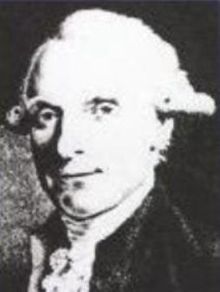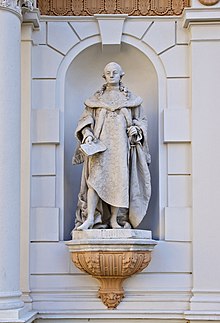Johann Anton von Pergen
Johann Baptist Anton Graf von Pergen (born February 15, 1725 in Vienna ; † May 12, 1814 there ) was a diplomat and statesman of the Habsburg Monarchy . He was one of the most influential employees of Joseph II. As minister of state, he campaigned for the modernization of the higher education system and for the ecclesiastical influence to be suppressed. But he also reorganized the police force. The police were centralized and a secret police force was established. He performed this task again under Franz II and was largely responsible for combating oppositional forces.
He and his descendants used the Thomasberg suffix to distinguish from members of other lines of the family, which was widely ramified at the time .
Family and personal life
Johann Baptist Anton was born as the youngest son of Count Johann Ferdinand Wilhelm von Pergen and Maria Elisabeth, geb. Baron Orlick von Laziska, born. His father was then Vice-President of the Government for Lower Austria in judicial matters in Vienna. An older brother, Johann Joseph von Pergen , was Bishop of Mantua for 37 years , another, Johann Baptist Leopold, died in 1741 in the Battle of Mollwitz .
He himself married Philippine Gabriele Johanna Sophie, geb. Freiin von Groschlag zu Dieburg , a daughter of the President of the Reich Chamber of Commerce Philipp Karl von Groschlag (* 1692 in Dieburg , † 1757 in Wetzlar ). The marriage resulted in a son and two daughters, one of whom died in childhood. The son Joseph von Pergen later became vice-president of the court chamber, among other things, the daughter Maria Anna married a Count Breuner .
Before their marriage, his wife fell in love with the future Emperor Joseph II in Frankfurt am Main . Later she ran a large house in Vienna. He himself led an elaborate lifestyle and promoted the arts. This involved a high need for money. In 1782 he acquired the Pottenbrunn Palace and furnished it and the park with romantic buildings. A garden pavilion, designed as a Gothic temple, has been preserved.
Ascent
He received his school education from the Jesuits . Then he studied law . After completing his studies, in 1747 he became secretary at the imperial embassy in Kurmainz . He then served at the legation in Great Britain . After his return he took up his post in Mainz again . In 1750 he was assigned to accompany the British Minister Richecourt on his diplomatic trip to Germany. A short time later he was called to Vienna and in 1751 Maria Theresa appointed him chamberlain to the Archdukes Karl and Leopold .
In 1753 he became the imperial envoy in Mainz. His area of responsibility also included diplomatic relations with the other Rhenish electors and the fore Reich circles . On the occasion of the election of the highest burgrave of the Reichsburg Friedberg , he managed to alleviate the tensions between Protestant and Catholic knights. In the election of the provost of the Ellwangen monastery in 1756, he acted as imperial commissioner. In the same year he was again imperial envoy in Mainz.
During the Seven Years' War between 1757 and 1763 he administered the occupied Prussian territories in the west. He was President of the Imperial and Royal Occupation Administration in his capacity as an authorized minister in the Lower Rhine-Westphalian Empire . At the same time he served as an imperial commissioner at several German courts. In the royal elections in 1765 he was the royal Bohemian election ambassador.
Reich policy and educational reform
In 1766 he was next Georg Adam von Starhemberg Second Minister of State, member of the State Council and Deputy State Chancellor.
With regard to imperial politics, Pergen was somewhat opposed to Kaunitz . For this, an expansive expansion of the Habsburg monarchy was in the foreground. Pergen, who had known the imperial estates since his time in Mainz and other embassies , warned against a policy focused purely on Austria. In 1794 he wrote a memorandum on the importance of the Roman imperial crown for the House of Austria. He pleaded that the emperor should demonstrate a "love for Germany" and advised him "to want to defend the system with all [...] his might." The emperor did not follow this advice.
Pergen was primarily responsible for an educational reform around 1770. The state itself should take responsibility for the school system. The religious clergy should lose their role in the teaching office and be replaced by lay people or at least secular clergy. In addition, most subjects in secondary schools should be taught in German. Curricula should be drawn up and teacher seminars set up for schools . These should be financed from an endowment fund. This anti-clerical reform, which was committed to the Enlightenment, could not really be implemented against the resistance of Maria Theresa and conservative circles at court.
Between 1772 and 1774 he was governor of the territories in Galicia ( Kingdom of Galicia and Lodomeria ) acquired in the first division of Poland . He worked with the regional Polish nobility.
Organization of the police force
He then became colonel land marshal for Lower Austria in 1775 . After the organizational reforms by Joseph II, he also chaired the Lower Austrian government from 1782.
He was also the head of the police station and was therefore responsible for public security in Vienna. He also had the task of establishing a state police in all provinces and reforming the prison system. Pergen was supposed to standardize, centralize and modernize the organization of internal security in the hereditary lands. The staff should be more disciplined. Pergen was based on French models. Originally the emperor only wanted to submit the secret police to him, while the rest of the police should fall under the jurisdiction of the court chancellery . In fact, police departments have been set up in the larger cities . The secret police should act independently of the rest of the state administration. The heads of the state administrations should only be accountable to him for the remaining police matters. However, Pergen did not achieve his goal of a central police administration independent of other authorities until 1789. Now he was at the helm as Minister of State with a corresponding ministerial office. The police headquarters in the other provinces were now also subordinate to the Vienna Police Headquarters. This concentration of the police on himself increased Pergen's power and influence over the emperor. In 1791 he was retired from Leopold II due to an eye disease.
Fight against the revolution
In 1793 his eyes were healed by surgery. Franz II then called him back as Minister of Police. He restored the centralized police system as it had existed under Joseph II. In 1801 he was also given responsibility for censorship. The police and censorship station was created. Since Pergen's reorganization, Franz II and his successors have received the latest police report every morning.
Pergen assumed that the state order was threatened by a conspiracy. He even blamed conspirators for the outbreak of the revolution in France. Above all, he saw the Freemasons as a threat to the state. The population should therefore be monitored as effectively as possible because of the fear that the French Revolution would spill over. Changes regarding the expansion of the police's competencies were no longer published, but only made known to the competent authorities in cabinet ordinances or secret instructions. The tightening of censorship, the surveillance of foreigners and the Jacobin trials also fell during this period.
With his organization, Pergen laid the foundations that Josef von Sedlnitzky could fall back on with his anti-liberal policy during the Metternich era from 1814 to 1848.
Honors
In 1788 he was awarded the Grand Cross of the Royal Hungarian Order of St. Stephen for his services . At the former Lower Austrian Lieutenancy in Vienna there is a statue created by Josef Kassin in 1897.
Works
- A memorandum from Count Johann Anton Pergen to the Austrian co-regent Joseph II about the “value of the property of the Kaysercrone” for the House of Austria (1766) Online edition on germanhistorydocs
literature
- Constantin von Wurzbach : Pergen, Johann B. Anton Graf . In: Biographisches Lexikon des Kaiserthums Oesterreich . 22nd part. Kaiserlich-Königliche Hof- und Staatsdruckerei, Vienna 1870, pp. 1–5 ( digitized version ).
- Paul P. Bernard: From the Enlightment to the Police State. The Public Life of Johann Anton Pergen. Chicago, 1991
- Peter Fuchs: Pergen, Johann Anton Graf von. In: New German Biography (NDB). Volume 20, Duncker & Humblot, Berlin 2001, ISBN 3-428-00201-6 , pp. 185 f. ( Digitized version ).
Web links
Individual evidence
- ↑ a b c Article Pergen, Johann B. Anton Graf and Pergen, die Grafen, Genealogie in: Biographisches Lexikon des Kaiserthumes Österreich , Volume 22, accessed on April 14, 2017.
- ^ History of the Pottenbrunn Palace
- ^ Georg Schmidt: Change through reason. Germany 1715-1806. Munich, 2009 p. 191, Karl Otmar von Aretin: Das Reich. Peace Order and European Balance 1648–1806. Stuttgart, 1996 p. 29
- ^ Sylvia Hahn: Migration - Work - Gender: Labor migration in Central Europe from the 17th to the beginning of the 20th century. Göttingen, 2008 p. 121, Michaela Hohkamp : fear of revolution and the search for a “democratic attitude”. In: Horizons of thought and scope for action. Historical studies for Rudolf Vierhaus on his 70th birthday. Göttingen, 1992 p. 237, Helmut Reinalter: Joseph II. Reformer on the imperial throne. Munich, 2011 p. 43
- ^ Helmut Reinalter: French Revolution and the Public in Austria. In: French Revolution and German Public. Munich et al., 1992 p. 22, Rudolf Hoke: Austrian and German legal history. Vienna et al., 1996 p. 312
| personal data | |
|---|---|
| SURNAME | Pergen, Johann Anton von |
| ALTERNATIVE NAMES | Pergen, Johann Baptist Anton von |
| BRIEF DESCRIPTION | Diplomat and Minister of the Habsburg Monarchy |
| DATE OF BIRTH | February 15, 1725 |
| PLACE OF BIRTH | Vienna |
| DATE OF DEATH | May 12, 1814 |
| Place of death | Vienna |


